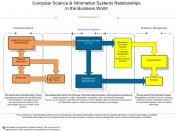Information and Accounting Functions
What is the function of contemporary accountants? What is an accounting information system (AIS)?
Changes in technology have altered the role of accountants. Traditionally, AIS has had its own set of specific functions and has relied on its own devices, such as journals and ledgers, and its own procedures, double-entry bookkeeping. Accounting developed, maintained, and operated the AIS independently of other business functions. Accountants were narrowly focused on the production and validity of financial information. Now they are information services specialists and business consultants.
Traditional View of Accounting
Traditional functions of an AIS include recording, storing, processing, and reporting financial information and related non-financial information (for example, purchase dates and depreciation methods for fixed assets). Traditionally accounting has focused on periodic, historical, and aggregated data, primarily in the form of financial statements. It has been limited largely to financial transactions. Accounting systems are self-contained and standardized.
Accounting information is restricted to stewardship and analysis decisions that use the financial accounting model. Emphasis is on objectivity and reliability of information. Accounting is separated from other business functions; the accountant plays the role of scorekeeper.
Transition to Computers
The original use of computers in accounting focused on automating the record-keeping function. Manual books were replaced by computer "books." The automated systems retained the same functions, orientation toward the accounting cycle, and retained an emphasis on financial statements as in the traditional view. Computers made accounting functions faster, less expensive, and more accurate.
Database Accounting Systems
Under a database system, accounting is part of the management information system. The system aims to capture all aspects of economic events relevant to decision makers. The orientation is toward decision making, not just financial statements. The emphasis is on relevance and timeliness. Transactions and financial statements are part of the...


